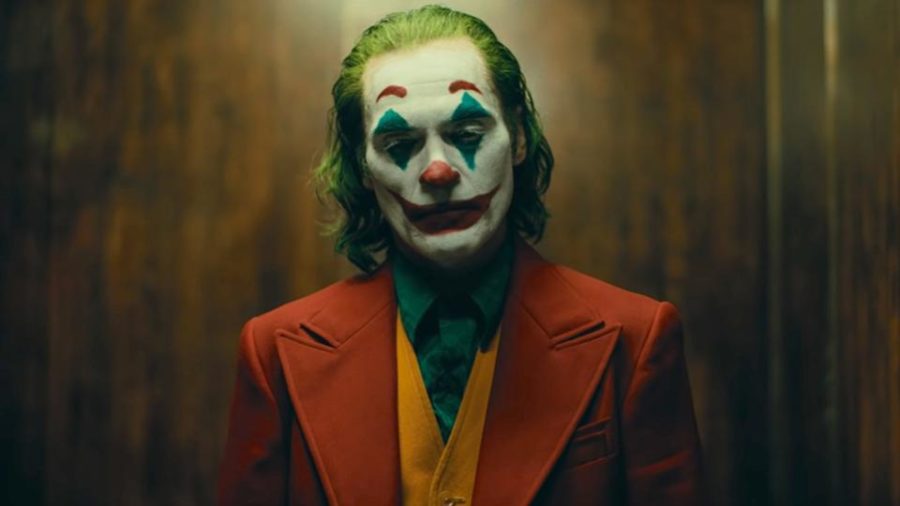PCP: JOKER’S IMPACT ON MODERN CINEMA
Students everywhere are facing the effects of the mentally controversial movie “Joker”
November 14, 2019
On Oct.4, 2019, Joker hit box office theaters with a head spinning impact. The reception for the movie, while topping recent hits such as Venom and older classics such as the Halloween franchise, has been met with bitter backlash. Joker does contain traditionally uncomfortable topics, and despite having important real world themes, select fans of the age-old villain are claiming this movie went too far.
The Joker is Shining a Light on Important Societal Issues
Joker has overall been given a mixed review. However, the modern societal themes tackled in the movie are clear cut and highly suggestive.
Paige Riddle is a senior who booked their ticket and experienced the movie, in all of its ‘uncomfortable’ glory. Having seen and reviewed hundreds of films from a variety of genres for the internet, Riddle was not shocked by the backlash the film received.
“Joker is painful, but it’s painful with a purpose,” said Riddle.
The movie does a fantastic job of blurring the lines of fantasy, reality, and delusion. Mental illness, a prominent topic in society, is pushed by the film to be discussed openly. Arthur, the film’s main character, is undermined and perceived as insane by his society. In combination with his physical illness, Arthur’s distinct behavioral mannerisms isolate him from others, causing him to be labeled by society as the “Joker.”
“He is ill. Both mentally and physically. People are abusing him because of his disability and it is not a fun experience to witness, however, people are abused for being disabled in our real life all the time,” said Riddle.
Joker also tackles the themes of poverty and class with Arthur and his mother, Penny, relying on government welfare and Arthur’s minimum wage clown entertainment job to scrape by. There is a clear class distinction between the rich and the poor in Gotham. This is to such an extent that the lower class of Gotham is called “jealous” of the rich and the “clowns” of society.
Corruption is also a deeply represented theme in the film. After Arthur murders three businessmen on a train, riots begin in response. While he does not intend to break down and expose the corruption of Gotham, the growing pressure erupts and Arthur acts as the trigger. The film demonstrates this theme repeatedly from when Randall gives Arthur a gun to when Arthur executes the talk show host on live television.
“The rich get richer and the poor get poorer. This type of corruption is presented beautifully in Gotham and is demonstrated in our everyday world. It drives class division and [nobody’s] happy with that. Not in Gotham, not on earth,” said Riddle.
Thus, if the Joker has the uncomfortable yet important truths of common society, why would viewers insist that it is ‘too much for everyday cinema?’
The deliverance of these truths is what makes viewers uncomfortable. In combination with humanizing and creating empathy for one of history’s most iconic villains, Joker presents real-world problems in a very dramatic, yet reflective way.
By Michelle Arshad
The Negative Impacts of Joker on Viewers
Some movie-goers may believe that films such as Joker do not promote violence. However, multiple studies show otherwise; such violent themes can in fact, have a negative impact on kids and those with mental disorders.
“Kids who watched [violent] movies were more likely to pull the trigger. On average, they pulled the trigger two to three times and spent four to five times longer holding it,” said Vanessa Lobue from Psychology Today.
The effects of gory movies on children can range from minimal to extreme, in some cases, such as in the studies by Lobue. These movies can increase violence in younger children drastically, making them act out and develop aggressive tendencies that may lead to violence in the future.
“While I do like these movies, they may cause problems for people in their earlier stages of life, making them more violent in the future if they continue to watch violent movies,” said junior Kira Worthey.
Along with these studies that show the effects gory movies have on people’s behavior, viewers may also be traumatized by the events happening in the movie. Some may have similar experiences in real life to the darker events that are shown in film, potentially triggering a response from any post-traumatic stress disorder (PTSD) the person may have.
“When kids are young, they can experience bad things with their parents or even with events that happen at school. These things can lead to kids not liking the movies or even wanting to watch them by bringing up past events in their life,” said Matthew Ruiz.
With people having different past experiences with horror films, responses to these movies may differ. Many believe that these films do not have an effect on people in the real world, but events such as domestic violence, abuse, car accidents, or even natural disasters are common. As a society, we should ensure that we are taking events shown in the movies seriously, as it can negatively affect all people in different ways.
By Julio Roman



















